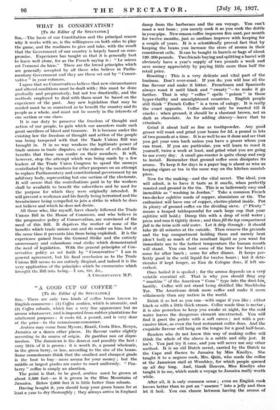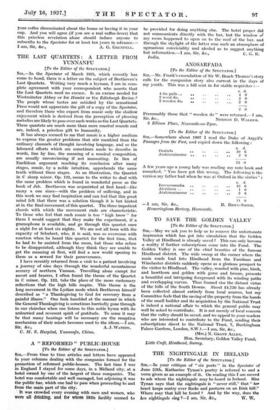" A GOOD CUP OF COFFEE " [To the Editor
of the SPECTATOR.] SIR,—There are only two kinds of coffee beans known to English commerce : (1) Coffea arabica, which is aromatic, and (2) Coffea robusta, which has a very fine appearance but no aroma whatsoever, and is imported from rubber plantations for adulterant purposes : it costs 6d. a pound, and is very dear at the price—to the connoisseur-consumer.
Arabica may come from Mysore, Brazil, Costa Rica, Kenya, Jamaica or a dozen other places. Its flavour varies slightly according to its source of origin. De gustibus non est dispu- tandum. The Jamaican is the dearest and possibly the best : very little of it is grown : it is worth 2s. a pound wholesale; in the green berry, or less, according to the size of the beans. Some connoisseurs think that the smallest and cheapest grade is the best to buy—more aroma for your money ; but the middle or largest grades are easier to roast uniformly. " Pea- berry " coffee is simply an abortion.
The point is that, to be good, arabica must be grown at about 3,500 feet—as it is grown in the Blue Mountains of Jamaica. Below 2,000 feet it is little better than robusta.
Having bought it, you should keep your green beans for at least a year to dry thoroughly ; they always arrive iuEngland damp from the barbecues and the sea voyage. You can't roast a wet bean ; you merely cook it as you cook the dottle in your pipe. New season coffee improves five cent. per month for twelve months, just as sardines improve with keeping for a couple of years. It is a scientifically proved fact that by keeping the beans you increase the store of aroma in their constituent cells. It can be bought in barrels or bags of about 120-200 pounds. Two friends buying and splitting a barrel will obviously have a year's supply of two pounds a week and save money appreciably by paying little more than half the retail price.
Roasting : This is a very delicate and vital part of the business. Don't over-roast. If you do, you will lose ally the fine flavour and make it bitter. Frenchmen and Spaniards always roast it until black and " sweaty "—to make it go further. That is why " coffee " spells " poison " in those hyper-thrifty and unenlightened countries. English people still think " French Coffee " is a term of eulogy. It is really, the exact opposite. Coffee should only be roasted till it cracks : when ground, it should be a chestnut brown, not so dark as chocolate. As for adding chicory—leave that to criminals.
Grind it about half as fine as toothpowder. Any good grocer will roast and grind your beans for 3d. a pound in lots of two pounds at a time. It is as well to see it done and see that you get your own back unless you have a grocer whom you can trust. If you are particular, you will learn to roast it yourself, twice a week at least, and grind what you are going to use every day. A small gas-roaster is quite cheap and easy to install. Remember that ground coffee soon dissipates its aroma. To keep it for days in a paper bag is about as wise as keeping cigars or tea in the same way on the kitchen mantel- piece.
Now for the making—and the vital secret. The ideal, you will admit, is to have it taste as it smells, when perfectly roasted and ground in the tin. This is as ludicrously easy and incredible as " washing in• Jordan." Take a common French two-decker cafetiere made of copper, aluminium or tin. The enthusiast will have one of copper, electro-plated inside. nit in plenty of ground coffee on the dividing sieve. (" Plenty" means a heaped tablespoonful for each large cup that yonr cafetiere will hold.) Damp this with a drop of cold water press and ram it tightly down ; and then fill the top compartment full to the brim with cold water. Let it drip through : it should take 20-25 minutes at the outside. Then remove the grounds and the top compartment holding them and merely heat (don't boil) as much of the resultant liquid as you want for immediate use to the hottest temperature the human mouth will stand. You can heat some of the brew for breakfast ; some for after lunch ; some for after dinner. It keeps per- fectly good in the cold liquid for twelve hours ; but it dete- riorates if kept longer, as Eau de Cologne does, if left un- corked.
Once boiled it is spoiled ; for the aroma depends on a very volatile essential oil. That is why you should fling any " machine " of the American " Cona " type into the dust-bin; hastily. Coffee will not stand being distilled like Stockholm Tar. The Americans drink more coffee and make it more villainously than any nation in the world.
Drink it as hot as you can—with sugar if you like ; either black or with a little thick cream. Coffee made thus is nectar it is also powerless to keep you awake at night, for the cold water leaves the dangerous element unextracted. You will find it greet the palate with a soft caress ; not with a per-
cussive blow, as even the best restaurant coffee does. And the exquisite flavour will hang on the tongue for a good half-hour. Readers who do not know this way of making coffee will think the whole of the above is a subtle and silly jest. It
isn't. You just try it once, and you will never use any other method. It is an old Dutch secret, carried by the Dutch to the Cape and thence to Jamaica by Miss Knollys. She taught it to a negress cook, Mrs. Quin, who made the coffee at the Jamaican stall at Wembley, for which people queued up all day long. And, thank Heaven, Miss Knollys also taught it to me, which made a voyage to Jamaica really worth while.
After all, it is only common sense ; even an English cook knows better than to put an " essence " into a jelly and then let it boil. You can choose between having the aroma of your. coffee disseminated about the house or having it in your cup. And you will agree (if you are a real coffee-lover) that this priceless revelation alone should induce anyone to subscribe to the Spectator for at least ten years in advance.—











































 Previous page
Previous page